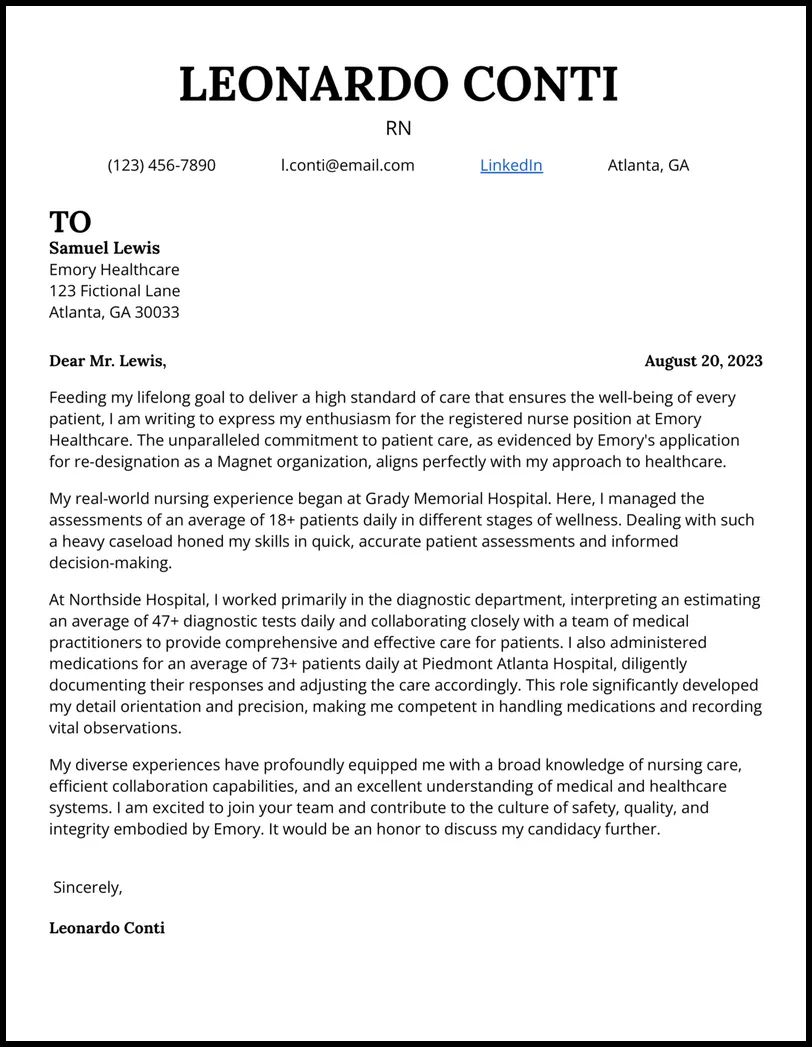The Importance of a Strong Nursing Cover Letter
In the competitive field of nursing, a well-crafted cover letter is your first opportunity to make a lasting impression on potential employers. It’s more than just a formality; it’s a crucial tool that allows you to showcase your personality, skills, and passion for nursing beyond the confines of your resume. This document provides a platform to express why you are the ideal candidate for a specific role or program and how your qualifications align with the employer’s needs. A compelling cover letter can significantly increase your chances of securing an interview and ultimately, landing your dream nursing position. Failing to submit a strong cover letter is a missed opportunity, and often results in the resume being discarded. A well-written cover letter speaks volumes about your communication skills, attention to detail, and genuine interest in the nursing profession.
Why Cover Letters Matter in Nursing
Cover letters matter because they provide context to your application, allowing you to tell your story in a narrative form. They offer an opportunity to expand on your resume, highlighting specific experiences, skills, and achievements that make you a standout candidate. For nursing students and professionals alike, cover letters are critical for demonstrating a genuine interest in the specific institution or role. They also provide a space to address any gaps in your resume, such as a career change or a period of unemployment, and demonstrate your proactive approach. Furthermore, cover letters showcase your communication skills, which are essential in the nursing profession. Effective communication is paramount for patient care, teamwork, and interacting with diverse medical teams. A well-written letter reflects your ability to articulate your thoughts clearly, precisely, and professionally.
Key Components of a Nursing Cover Letter
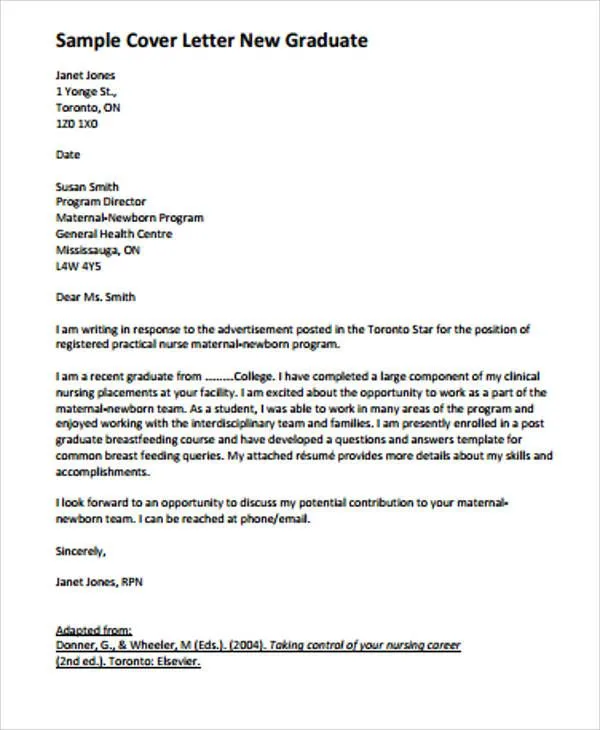
A successful nursing cover letter includes several key components that collectively create a compelling application. Begin with a professional header, including your contact information and the date. Address the letter to the hiring manager, or if unknown, use a general salutation like “Dear Hiring Manager.” The introduction should immediately grab the reader’s attention by stating the position you’re applying for and expressing your enthusiasm. In the body of the letter, highlight your relevant skills and experiences, relating them directly to the job requirements. Quantify your accomplishments whenever possible; for instance, “reduced patient fall rates by 15%.” Conclude with a strong call to action, expressing your interest in an interview, and thank the reader for their time and consideration. Always proofread your letter for any grammatical errors or typos before submitting it to ensure a professional and polished presentation.
Top 5 Proven Nursing Cover Letter Examples
Example 1 Cover Letter for Entry-Level Nursing Position
This example is tailored for new graduates or those with limited experience. It focuses on academic achievements, clinical rotations, and transferable skills. The goal is to demonstrate your eagerness to learn and contribute to the team. Begin by stating your interest in the position and briefly mentioning your nursing degree. Highlight relevant coursework, such as patient care, pharmacology, or critical care, and briefly describe a significant clinical experience. Mention any volunteer work or extracurricular activities that showcase your dedication, teamwork, and communication skills. Conclude by expressing your enthusiasm for the opportunity and your commitment to providing exceptional patient care. Make sure to show them you’re a fast learner, and open to new experiences. This highlights you’re an ideal candidate for entry level jobs.
Highlighting Skills and Experience
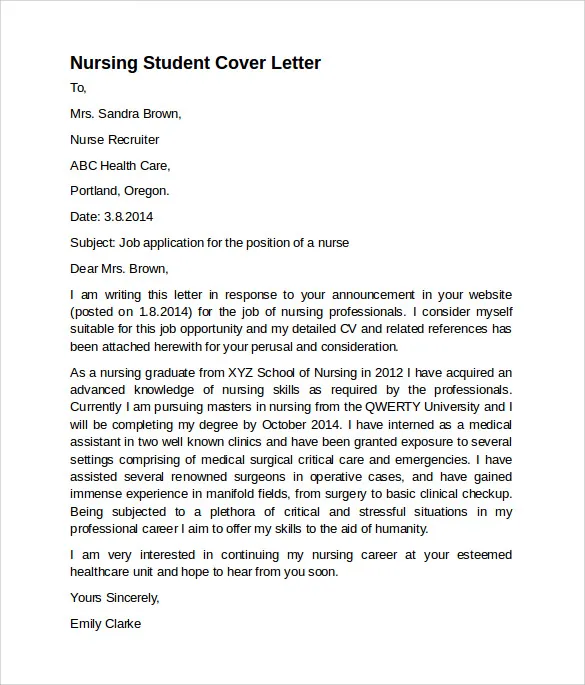
When highlighting skills, concentrate on those most relevant to the entry-level position. These might include basic patient assessment, medication administration, wound care, and electronic health record proficiency. Provide specific examples of how you’ve applied these skills during clinical rotations or volunteer work. For example, you could detail a situation where you successfully administered medication, assessed a patient’s condition, or communicated with family members. Also, emphasize your soft skills, such as empathy, communication, and problem-solving, as these are crucial for providing quality patient care. Show your ability to work in a team, follow instructions, and maintain professionalism at all times. These skills are often just as important, if not more, than technical skills in an entry-level position. Tailor your cover letter to match the job description by using the same language and keywords used in the job posting.
Example 2 Cover Letter for Nursing Clinicals
Cover letters for clinical placements must demonstrate your suitability for a hands-on learning environment. They must focus on your academic achievements, clinical goals, and your willingness to learn. Start by introducing yourself and specifying the clinical placement you’re seeking. Briefly mention your current nursing program and any relevant coursework or certifications. Clearly state your clinical goals, what you hope to gain from the experience, and why you’re interested in the particular setting. Highlight any past experiences related to patient care, such as volunteer work in a hospital or community clinic. Emphasize your eagerness to learn, your ability to follow instructions, and your dedication to providing excellent patient care. Mention any specific skills you hope to develop during the clinical rotation, such as wound care, IV insertion, or patient education. Show your enthusiasm for this opportunity and express your appreciation for being considered.
Emphasizing Academic Achievements
In a cover letter for clinicals, highlighting academic achievements is essential. Include your GPA if it’s above average, and mention any honors or awards you’ve received. Focus on coursework relevant to the clinical placement, such as medical-surgical nursing for a hospital setting or pediatric nursing for a children’s hospital. Mention any special projects or presentations you’ve completed that showcase your knowledge and understanding of nursing principles. If you’ve received any commendations from professors or clinical instructors, it’s appropriate to mention those as well. By emphasizing your academic successes, you demonstrate that you’re a dedicated student with a strong foundation in nursing theory and practice. Also, highlight any research work, presentations, or specific courses that align with the clinical setting. These details provide further context to your academic accomplishments.
Example 3 Cover Letter for a Nursing Student
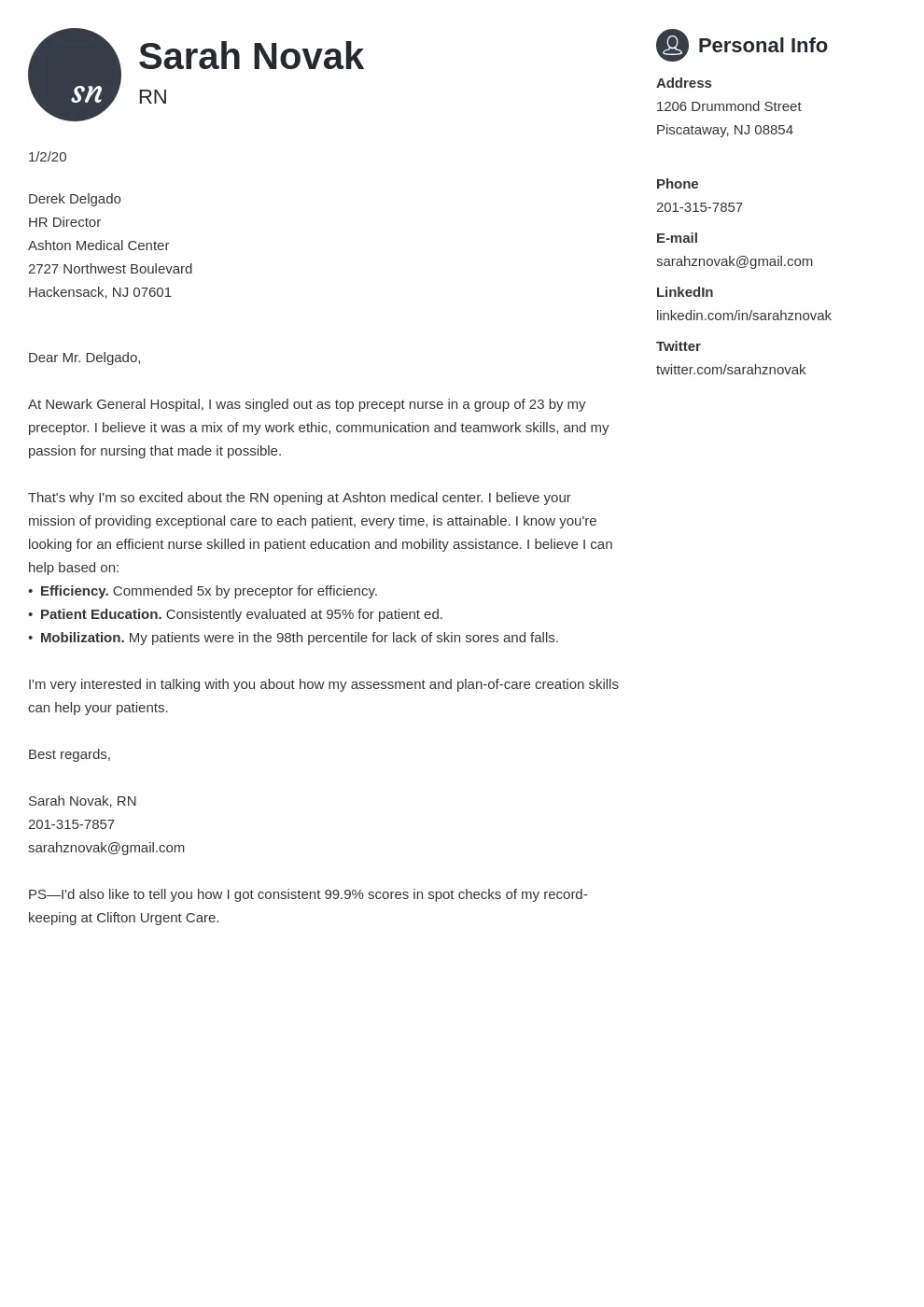
This example is perfect for nursing students who may not have extensive work experience but wish to showcase their potential. It needs to emphasize your education, clinical rotations, and passion for the nursing profession. Begin by expressing your desire to join the team, mentioning the specific role or department you are interested in. Clearly state your nursing program, expected graduation date, and any relevant coursework. Highlight the clinical rotations you’ve completed, detailing your experiences, the skills you’ve developed, and your learning outcomes. Include any volunteer or extracurricular activities. Demonstrate your passion for nursing, mentioning your desire to provide compassionate care, work in a team environment, and make a difference in patients’ lives. Show how your values align with the healthcare organization’s mission.
Showcasing Passion and Enthusiasm
To showcase passion and enthusiasm, include specific examples of why you chose nursing and what inspires you about the profession. Describe a moment during your clinical rotation where you felt a strong connection with a patient, or discuss a time when you overcame a challenging situation. Show how you’ve gone above and beyond in your studies or clinical experiences. Demonstrate a desire to learn and grow as a nurse. Mention your commitment to patient advocacy, continuous professional development, and adherence to ethical principles. Emphasize any experiences where you’ve demonstrated empathy, compassion, and a patient-centered approach. Conclude by expressing your eagerness to start your nursing career and contribute positively to the team.
Example 4 Cover Letter for a Specific Nursing Specialty
Cover letters for specific nursing specialties must directly address your qualifications for that particular area. It’s crucial to have a strong understanding of the specific requirements and skills needed for that specialty. Start by stating your interest in the specialty, such as critical care, oncology, or pediatrics, and the position you’re applying for. Mention your nursing degree and relevant certifications, such as CCRN for critical care or OCN for oncology nursing. Highlight any past experience in the specialty, including clinical rotations, volunteer work, or previous employment. Emphasize your knowledge of specific procedures, equipment, or patient populations. Provide specific examples of how your skills and experiences align with the job requirements. Also, demonstrate your understanding of the challenges and rewards of the specialty, showing why you are passionate about working in that area. Tailor the language and content to reflect the terminology and practices of the specific specialty.
Tailoring to the Specialty Requirements
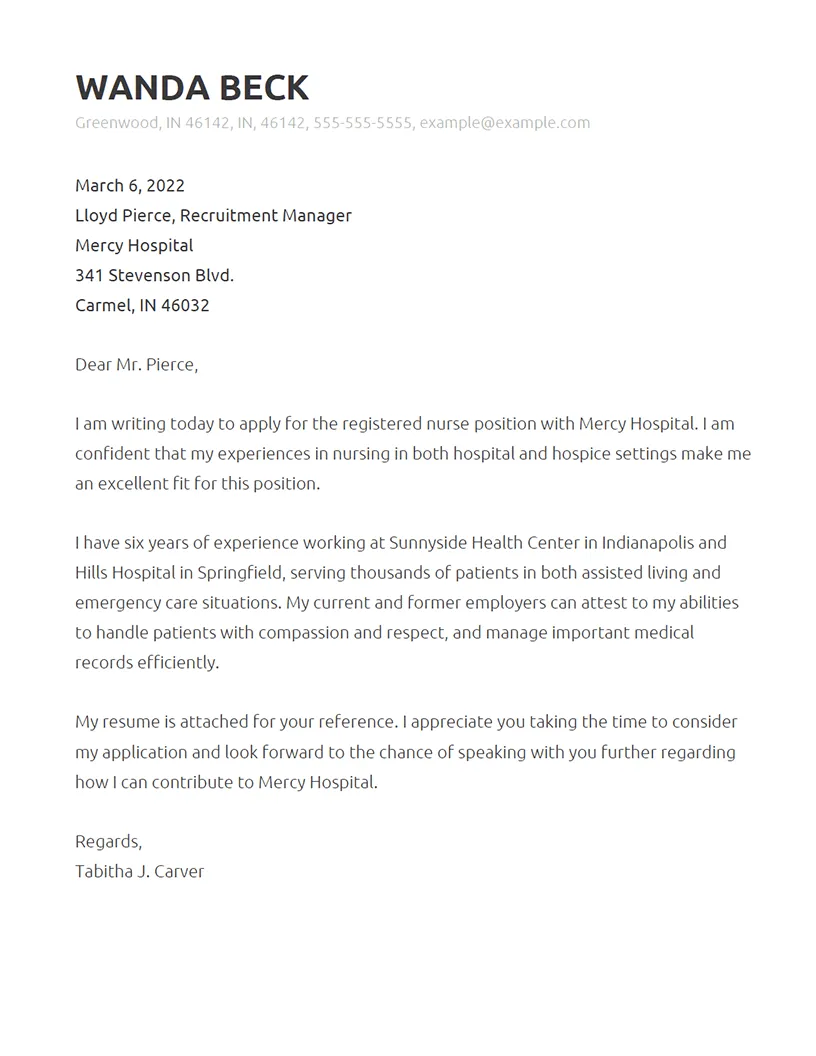
To tailor your cover letter, research the specialty thoroughly, understanding the necessary skills, knowledge, and experience. Customize your letter to address the specific needs of the hiring department. Highlight your experience with relevant procedures, such as administering chemotherapy (for oncology), managing ventilators (for critical care), or caring for children with specific conditions (for pediatrics). Mention any specialized training or certifications. Quantify your accomplishments by citing specific outcomes, such as reducing patient complications, improving patient satisfaction scores, or implementing best practices. Also, show your understanding of the challenges and rewards of working in this particular specialty. Conclude your letter by reiterating your passion for the specialty and your excitement about the opportunity. Be specific with the terminology, and if possible mention specific equipment or protocols. Always tailor the language and content to reflect the terminology and practices of the specific specialty.
Example 5 Cover Letter for a Nursing Internship
When applying for a nursing internship, focus on your enthusiasm, academic achievements, and commitment to learning. Start by stating your interest in the internship and the specific department you’re applying to. Mention your nursing program, expected graduation date, and any relevant coursework or clinical experiences. Highlight any leadership roles, volunteer work, or extracurricular activities that show your commitment to the nursing profession and ability to work in a team. Describe your learning goals for the internship and express your eagerness to gain practical experience. Include examples of how you’ve applied theoretical knowledge in a clinical setting. Demonstrate your passion for nursing by highlighting your patient-centered approach, compassion, and desire to make a difference in patients’ lives. Showcase your willingness to learn, adapt, and contribute positively to the team. The internship is all about the learning experience so reflect that in your letter.
Demonstrating Professionalism and Suitability
Demonstrate your professionalism by using a formal tone and language, and adhering to all formatting requirements. Proofread the letter carefully for any grammatical errors or typos. Highlight your relevant skills and experience, aligning them with the internship requirements. Provide specific examples of how your skills can benefit the team. Mention any awards, honors, or academic achievements that demonstrate your dedication and competence. Showcase your understanding of the importance of patient safety, ethical considerations, and teamwork. Express your excitement for the opportunity and your commitment to providing exceptional care. Include a professional signature at the end. When showcasing your suitability, highlight your communication skills, your ability to work in a team, your problem-solving skills, and your willingness to learn. Be sure to address the specific needs of the internship program, reflecting a genuine interest in contributing.
Tips for Customizing Your Cover Letter
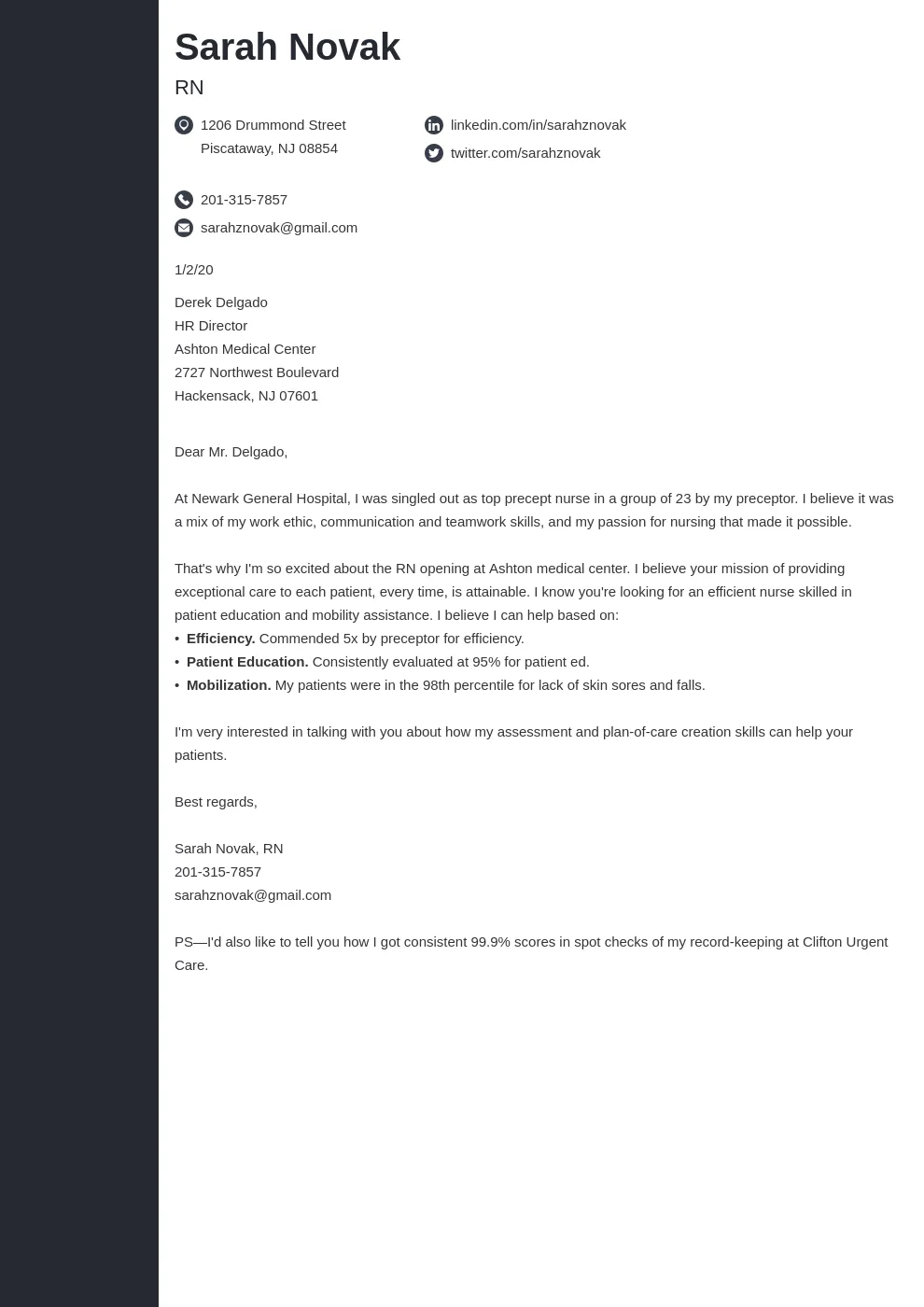
Researching the Target Institution
Before you start writing your cover letter, conduct thorough research on the institution you’re applying to. Visit the organization’s website and learn about its mission, values, and patient care philosophy. Understand the specific role, department, and the needs of the hiring team. Tailor your cover letter to match their mission, values, and priorities. Identify the specific challenges the institution faces and address how your skills and experience can help overcome them. Show that you understand the healthcare environment and are committed to contributing to the organization’s success. This research will inform your writing and allow you to speak to the organization’s specific needs and expectations. Tailoring your letter shows you care enough to do the research, and that is a huge advantage.
Tailoring to the Job Description
Carefully review the job description, and identify the key skills, qualifications, and experiences required. Use the same keywords and phrases from the job description throughout your cover letter. Structure your letter to align with the job requirements, addressing each point directly. Provide specific examples of how your skills and experiences meet these requirements. Make sure to highlight experiences that showcase your ability to perform the job’s essential functions. Customize your language to reflect the terminology used in the job posting. When addressing the specific requirements, show how you can address the employer’s needs. Use action verbs to describe your accomplishments and responsibilities. Always ensure that your cover letter directly addresses the requirements listed in the job description. Your objective is to show you’re the best fit for the specific job at hand.
Proofreading and Editing
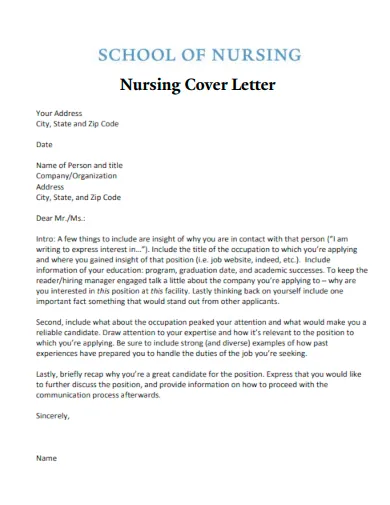
Proofreading and editing your cover letter is critical to ensure accuracy, professionalism, and clarity. Carefully review your letter for any grammatical errors, typos, and spelling mistakes. Read your letter aloud to catch any awkward phrasing or sentence structure issues. Seek feedback from a mentor, career counselor, or trusted colleague to get a second opinion. Ensure that your formatting is consistent and professional. Check for any inconsistencies in font, spacing, or bullet points. Make sure your contact information is correct. Edit your cover letter multiple times, and don’t rely solely on spell check. Proofreading ensures a polished and professional presentation, reflecting your attention to detail and professionalism. Always take the time to proofread and edit your cover letter before submitting it.
Final Thoughts and Next Steps
A strong nursing cover letter is a powerful tool to secure interviews and launch your nursing career. Remember that crafting a compelling cover letter is an ongoing process. Continually update your letter to reflect your latest experiences, skills, and achievements. The examples provided serve as a starting point. Tailor them to your specific situation, highlighting your unique strengths, and customizing them to match the specific job requirements. Once you’ve completed your cover letter, prepare for the interview. Review your cover letter and resume, and prepare to discuss your experiences and skills in detail. Practice answering common interview questions, and consider doing a mock interview. By following these guidelines, you can create a cover letter that showcases your potential, sets you apart from other candidates, and moves you closer to your career goals. The last step is to update your letter as you gain new experiences or skills, and always tailor the letter.
